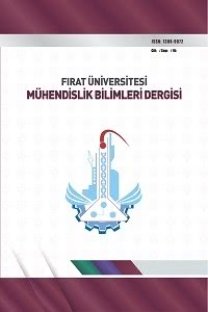Klima Sistemlerinin Yanlış Montajının Elektrik Tüketim Maliyetine Olan Etkilerinin İncelenmesi
Elektrik Tüketimi, Klima Sistemleri, Küresel Isınma, Yanlış Montaj
Investigation of the Effects of Incorrect Installation of Air Conditioning Systems on Electricity Consumption Cost
Air Conditioning Systems, Electricity Consumption, Global Warming, Incorrect Installation,
___
- International Energy Agency, (2018). https://www.iea.org/news/air-conditioning-use-emerges-as-one-of-the-key-drivers-of-global-electricity-demand-growth.
- A. TURAN, A. ONAT, VRF ve FAN COIL SİSTEMLERİNİN ENERJİ TÜKETİMİ VE MALİYETLERİ AÇISINDAN KARŞILAŞTIRILMASI, Int. J. Adv. Eng. Pure Sci. 32 (2020) 309–319. https://doi.org/10.7240/jeps.663461.
- M.A. Aktacir, O. Büyükalaca, T. Yilmaz, Life-cycle cost analysis for constant-air-volume and variable-air-volume air-conditioning systems, Appl. Energy. 83 (2006) 606–627. https://doi.org/10.1016/j.apenergy.2005.06.002.
- E. KARA, M.A. AKTACİR, M. KUŞ, Mono ve Multi Split Klima sistemlerinin Ömür Boyu Maliyet Analizi, Harran Üniversitesi Mühendislik Derg. 8733 (2021) 0–3. https://doi.org/10.46578/humder.941169.
- S. Canbazoğlu, A. Erdoğan, Klima Santrali Fanları için Rüzgâr Enerjisi Destekli Hibrit Bir Tahrik Sistemi Tasarımı Design of Hybrid Drive System Aided Wind Energy for Air Handling Unit ’ s Fans, 3 (2015) 31–47.
- G.Z. SÖĞÜT, A.H.G. , T.Hikmet KARAKOÇ, Ticari Binalarda Güneş ve Rüzgar Destekli Havalandırma Fanlarının Enerji ve Maliyet Etkinliğinin İncelenmesi, 4 (2014) 32–39.
- K.J. Chua, S.K. Chou, W.M. Yang, J. Yan, Achieving better energy-efficient air conditioning - A review of technologies and strategies, Appl. Energy. 104 (2013) 87–104. https://doi.org/10.1016/j.apenergy.2012.10.037.
- J. Ni, X. Bai, A review of air conditioning energy performance in data centers, Renew. Sustain. Energy Rev. 67 (2017) 625–640. https://doi.org/10.1016/j.rser.2016.09.050.
- Z. Ma, H. Ren, W. Lin, A review of heating, ventilation and air conditioning technologies and innovations used in solar-powered net zero energy Solar Decathlon houses, J. Clean. Prod. 240 (2019) 118158. https://doi.org/10.1016/j.jclepro.2019.118158.
- T.M.I. Mahlia, R. Saidur, A review on test procedure, energy efficiency standards and energy labels for room air conditioners and refrigerator-freezers, Renew. Sustain. Energy Rev. 14 (2010) 1888–1900. https://doi.org/10.1016/j.rser.2010.03.037.
- Z. Qi, Advances on air conditioning and heat pump system in electric vehicles - A review, Renew. Sustain. Energy Rev. 38 (2014) 754–764. https://doi.org/10.1016/j.rser.2014.07.038.
- Y. Yu, S. You, H. Zhang, T. Ye, Y. Wang, S. Wei, A review on available energy saving strategies for heating, ventilation and air conditioning in underground metro stations, Renew. Sustain. Energy Rev. 141 (2021) 110788. https://doi.org/10.1016/j.rser.2021.110788.
- E. ARSLAN, TVS PULMAN YOLCU VAGON KLİMA SİSTEMLERİNDE FV PANEL KULLANIMI VE ENERJİ VERİMLİLİĞİ, (2019).
- Globalprices, Electricity_prices, (n.d.) https://tr.globalpetrolprices.com/electricity_pric.
- Ministry of Economy Trade and Industry, Ministry of Economy Trade and Industry, n.d. https://www.enecho.meti.go.jp/category/saving_and_new/saving/index.html#general-section.
- B. İsmiç, Gelişmente olan ülkelerde elektrik tüketimi, ekonomik büyüme ve nüfus ilişkisi, Çankırı Karatekin Üniversitesi İktisadi ve İdari Bilim. Fakültesi Derg. 5 (2015) 259–274.
- SOĞUTMANIN GELECEĞİ ENERJİ VERİMLİ KLİMALAR İÇİN FIRSATLAR, (2018) 1–5.
- REPUBLIQUE FRANÇAISE, Code de l ’ énergie, (2022) 2022.
- Climate Central, Hotter Climate, More Cooling Demand, (n.d.). https://www.climatecentral.org/climate-matters/2020-cooling-degree-days.
- ISSN: 1308-9072
- Yayın Aralığı: 2
- Başlangıç: 1987
- Yayıncı: FIRAT ÜNİVERSİTESİ
Nanosilika Modifiyeli Bağlayıcıların Tekerlek İzi Direnci ve Sıcaklık Hassasiyetlerinin Belirlenmesi
Yeni Tip Çentikli Delta Kanat Modelinin Roketin Uçuş Performansına Etkilerinin Araştırılması
Cihan ÖZEL, Cevher Kürşat MACİT, Meral ÖZEL
SWARA, ARAS ve WASPAS Yöntemleri ile Yeni Şube Yeri Seçimi: Bir Kargo Firması Örneği
Emine Elif NEBATİ, Eda Nur VATANSEVER, Gülnihal MAKAS
Elif Nur YILDIZ, Harun BİNGÖL, Muhammed YILDIRIM
Farklı Güdüm Kurallarının Havadan Atılan Güdümlü Bir Havan Mermisi Üzerinde Karşılaştırılması
Hidrolojik Sapan Değer Tespitinde Komşu İstasyon Seçimi
Muharip Hava Aracı Otomatik İniş Koşusu İçin Güdüm Algoritmalarının Karşılaştırılması
